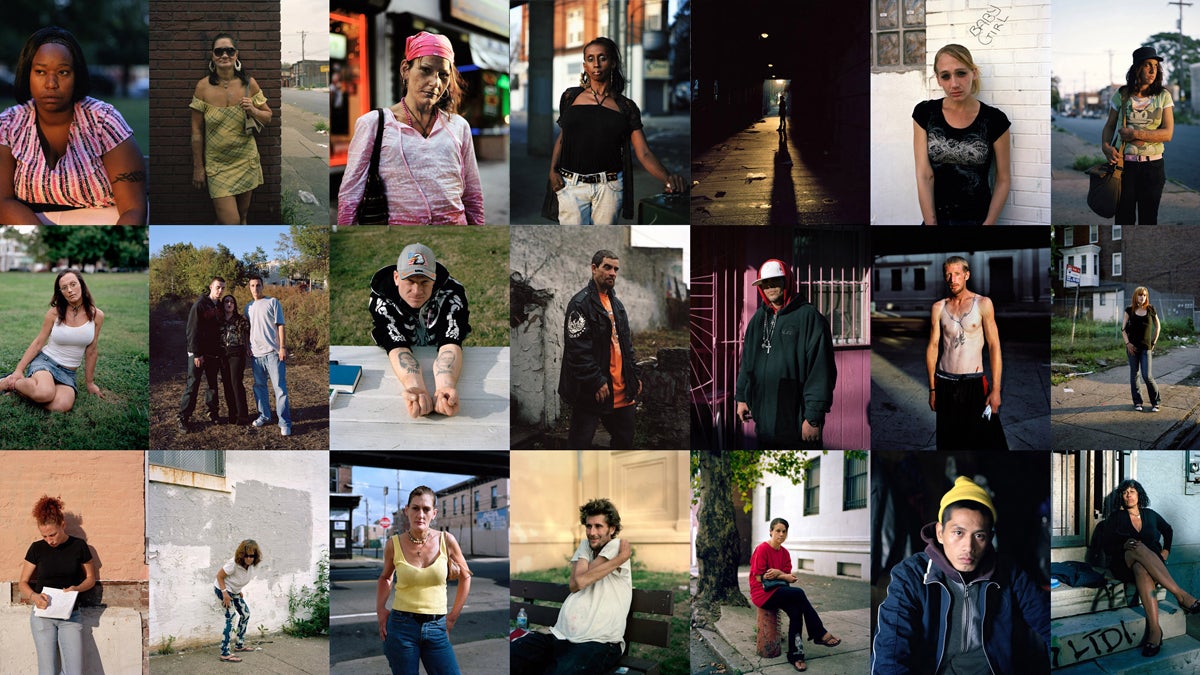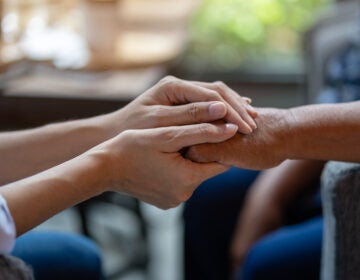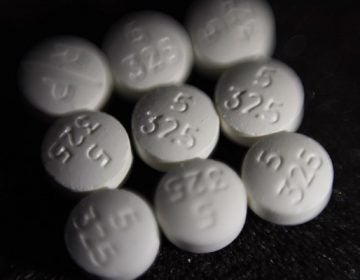On being addicted to heroin
I told myself that as long as I maintained that appearance, the rotten blackness steadily devouring me from within was under control and would eventually recede.

Detail from a collage by Kensington Blues creator Jeffrey Stockbridge. The blog and book is a portrait photography project of the residents who live along Kensington Avenue in North Philadelphia. (Image courtesy of Jeffrey Stockbridge)
It’s 2:26 a.m. I am in bed. My alarm will go off in less than six hours, and I said goodnight to my girlfriend around midnight, but I’m still wide awake. Instead of trying to sleep, I am staring at my computer, perusing the portraits and audio transcripts on photographer Jeffrey Stockbridge’s powerful blog, Kensington Blues.
For those who aren’t familiar, from 2009 to 2013, Stockbridge photographed and interviewed individuals he encountered on the streets of Kensington, an impoverished Philadelphia neighborhood which has been particularly ravaged by the current opioid crisis. Those who were willing told him their experiences, their aspirations, their struggles, living day to day and hour to hour with their addictions; and I consume these accounts hungrily, compulsively, stopping only after I have read every one.
This is not my first or even my second interaction with this blog — I’ve lost count of how many times I’ve read it from end to end. I now recognize the names, I can see the faces in my mind’s eye, I remember the stories — but here I am still, face awash in the glow of my laptop screen, curled up with these haunting images as though they were pictures of long-lost family. Indeed, the reason I am drawn to this blog over and over is that I feel a kinship with these people and their stories. Like them, I have a heroin addiction.
Or, I used to. I’ve been clean for a good amount of time now, but for about two years I sniffed anywhere from one to five bags of heroin a day. If I didn’t, I had to replace it with something analogous, or I would get sick. One bag was just enough to stave off withdrawal. Three or four would have me feeling nice. Five was a luxury.
You wouldn’t have thought it to look at me. I wasn’t out on the streets like the folks in Kensington Blues. I wasn’t filthy, covered in track marks, drooling, nodding off on my feet. I had a good job, nice clothes, a degree from a prestigious liberal arts school, a decent apartment, fruitful and productive creative endeavors. I grew up in a stable and loving upper-middle class home environment. I even had a spouse. To all appearances, I was the picture of functionality; and I told myself that as long as I maintained that appearance, as long as I wasn’t on the streets, the rotten blackness steadily devouring me from within was under control and would eventually recede.
This was false, of course.
Having an addiction sucks. It’s not fun or glamorous; it’s just miserable. Sure, the first few highs are blissful. As Mark Renton says in “Trainspotting,” “otherwise, we wouldn’t do it!” But pretty quickly, the reality of tolerance and physical dependence sets in, and then you’re chasing that ever-more-fleeting rush, because it’s the only good feeling you have left.
When you’re addicted, you never have enough money, or enough dope. Your body is in constant disrepair. Your mind is in constant disrepair. You are permanently afraid — of withdrawal, of losing everything — and that moment when the dope starts trickling down from the top of your spine to spread through your entire body is the only respite. You’re afraid of your own feelings, and you lose every coping mechanism you ever had. Heroin replaces them all.
It demands your primary focus, it comes before everything. Imagine, putting a little waxed-paper packet of off-white powder before your wife; it sounds insane, and you don’t want it to be that way, but your choice is gone.
Addiction eventually destroys everything around it. Ultimately, it killed my best friend, it destroyed my marriage, and would certainly have ruined the rest of my life if I had not gotten help.
No one picks this kind of existence. Who would? I certainly didn’t. Like almost every other drug user, I have my own little story of trauma and mental illness depositing me into the arms of that which would most readily take my pain away. We don’t start out wanting to be miserable; that’s a nonsense proposition. We start out wanting our misery to end, and for any number of reasons we see no other recourse. Later, we continue because we really do have no other recourse.
Yet the narrative persists: that people with addictions willfully choose their path and thus should be punished for it. Almost daily I read a fresh news story about the widespread human destruction caused by the surge in opiate use, about the city’s plans to “clean up the heroin hellscape” in Kensington, about some poor soul who overdosed; and on all of these stories I see comment after comment proclaiming “addicts” to be scum, arguing that we should just let them all die, that “if we just banned Narcan this problem would solve itself real quick,” that we should end all public assistance because it just subsidizes the existence of these “wastes of oxygen.” Heroin users are widely considered undeserving of that most basic and fundamental human right — being alive — just because they use heroin.
Heroin users are human beings. They are human beings who are suffering. Yes, some of us cheat and steal to feed our habits. Most of us lie. All of us are selfish. But these are not crimes for which anyone deserves to die, nor are they necessarily indicative of an intrinsic moral deficit. They are indicative of the tragic dissolution of free will. Addiction compels us to do things we never thought we would do, never thought we were even capable of doing. Its call is visceral, omnipresent, ceaseless.
This is not an excuse, but ask yourself: Which is more important to you? Which is more pragmatic? Which is more productive? To mete out punishment for crimes already committed, or to try to lay a foundation for social change, so no more crimes need to occur?
Some users, like me, are invisible, wasting away in secret, alive on the outside and dying on the inside. But make no mistake: We are no less addicted than the homeless junkies on the news, and no more deserving of empathy just because we manage to hide the grotesquery of our habit. Fundamentally, we are the same.
You might respond here: “But, you are different. You didn’t lose everything, and you got yourself out of it. It can be done. So if they aren’t doing it, that’s on them, isn’t it?”
Understand this: My addiction took the course it did because I come from privilege. I had the luxury of focusing just on recovery. I was able to access top-quality services with ease and I didn’t have to worry about things like where my next meal would come from or whether I’d have a place to stay from one night to the next. I have an excellent education and a good job, which provides me with extensive insurance; and even if those things failed me, my mother has enough money at any given point to meet any emergency need I might have. I was born with a safety net. Most of those folks out there living under the bridges over the defunct Conrail tracks in Kensington were not, but they still need the same level of support that I had, or they will never get better.
Real long-term services need to be available. Bulldozing the ramshackle tent city under the 2nd Street bridge and cramming its residents into shelters and unlicensed recovery houses will solve nothing. Stepping up arrests and incarcerations will solve nothing. Simply yanking those people off the streets of Kensington will not make them stop being addicted. These proposed solutions are the equivalent of shoving all one’s dirty laundry in the closet and then declaring the room to be clean — the mess isn’t gone, it’s just hidden from view.
The opioid epidemic has reached these proportions because this country’s drug policies are rooted in a fundamental refusal to see folks with a substance use disorder as people who first and foremost deserve compassion and need help. But we are. All of us.
—
This essay is published under a pseudonym at the author’s request due to its sensitive content and its potential impact on job security.
WHYY is your source for fact-based, in-depth journalism and information. As a nonprofit organization, we rely on financial support from readers like you. Please give today.



